AI for Enterprise Deals: Top 8 AI Tools, Use Cases, and Proven ROI
In this blog, we’ll explore how AI is reshaping enterprise deals from predictive deal scoring to generative proposal drafting, the tangible benefits it delivers, and the top tools enterprises are adopting.

Closing an enterprise deal is never simple. Unlike SMB sales, where decisions can happen in weeks, enterprise deals often stretch over months or even years. They involve multiple stakeholders, layers of approval, rigorous due diligence, and high-stakes negotiations. The complexity is such that even the most seasoned sales teams face challenges in maintaining accuracy, speed, and consistency throughout the process.
AI is increasingly becoming the differentiator in these situations. According to McKinsey, companies adopting AI in sales processes have reported up to 50% improvement in lead generation and qualification, and 40–60% reductions in call time efficiencies that matter when dozens of stakeholders are involved in a single enterprise opportunity.
In this blog, we’ll explore how AI is reshaping enterprise deals from predictive deal scoring to generative proposal drafting, the tangible benefits it delivers, and the top tools enterprises are adopting.
TL;DR (Key takeaways)
- AI reduces friction in enterprise sales by automating RFP responses, contracts, and compliance tasks, cutting cycle times by up to 90%.
- Proposal accuracy and trust improve with AI that grounds every response in verified content, ensuring 95% accuracy with zero hallucination.
- Win rates climb by 30–50% when AI tools align proposals with buyer priorities and evaluator criteria.
- Inventive AI leads in enterprise deal support, offering 10× faster first drafts, Win Themes for differentiation, and analytics to continuously improve.
- The greatest ROI comes when AI is woven into workflows not as a bolt-on, but as a core engine of enterprise sales execution.
Why Enterprise Deals Demand AI Differently Than SMB Deals
Enterprise deals are not just larger versions of SMB opportunities. They’re a different game altogether, with higher stakes and more friction points. Here’s why AI adoption looks different in this context:
- More stakeholders, more complexity
Enterprise opportunities often involve 10–15 decision-makers across finance, legal, IT, procurement, and operations. Keeping track of each stakeholder’s concerns, preferences, and objections is difficult without AI-driven insight and orchestration. - Longer sales cycles with higher drop-off risk
An enterprise deal may take 6–18 months to close, which increases the risk of losing momentum. AI helps by keeping engagement personalized and consistent throughout the cycle, flagging risks before they derail progress. - Greater scrutiny on compliance and accuracy
Mistakes in an SMB contract might be fixable; in enterprise deals, they can kill negotiations. AI-powered document intelligence and proposal automation ensure every clause, response, and attachment is accurate, compliant, and up-to-date. - Massive data to process
Enterprise buyers generate signals across calls, emails, RFPs, and product evaluations. Manual tracking misses patterns, but AI tools can analyze this data at scale, surfacing insights sales teams wouldn’t catch on their own.
Also read: RFP Best Practices: Steps and Tips for Success
How AI Accelerates Enterprise Deals: Core Use Cases and Tangible Benefits
Enterprise deals demand precision, speed, and coordination across long cycles involving multiple stakeholders. AI brings structure and intelligence to these complex workflows, not just by automating tasks, but by enhancing decision-making and maintaining accuracy across every touchpoint.
Below are the most critical use cases where AI delivers measurable business impact in enterprise sales cycles.
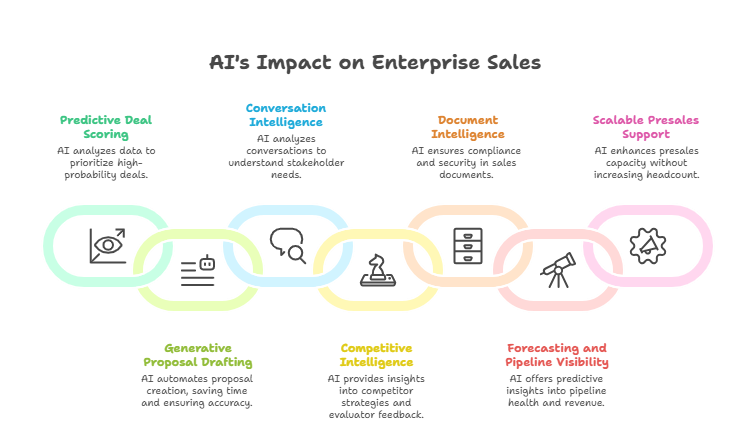
1. Predictive Deal Scoring and Prioritization
Enterprise sales teams juggle dozens of complex opportunities at once. Predictive AI models analyze historical win/loss data, buyer intent signals, and stakeholder engagement to forecast which deals are most likely to close.
This prioritization ensures sellers and presales engineers focus time where it matters most, a major productivity lift when Bain reports sellers spend only ~25% of their time actually selling. AI redistributes this balance by automating low-value work and unlocking significant revenue per seller without adding headcount.
Impact:
- Increases focus on high-probability opportunities.
- Reduces wasted effort on low-yield pursuits.
- Improves resource allocation for sales and presales.
2. Generative Proposal, Contract, and Compliance Drafting
Drafting proposals, term sheets, and due diligence documents is one of the biggest bottlenecks in enterprise sales. AI-powered platforms can auto-generate first drafts from approved internal content libraries, cutting turnaround times by up to 90%.
Solutions like Inventive AI ensure every response is grounded in verified company data (not the open web), maintaining 95%+ accuracy and zero hallucination while aligning each draft with buyer scoring rubrics.
Impact:
- 10× faster draft generation and review cycles.
- 95% accuracy ensures evaluator trust and compliance.
- 30–50% higher win rates when proposals mirror buyer criteria.
3. Conversation and Stakeholder Intelligence
Enterprise deals often involve 10–15 decision-makers across departments. AI-driven conversation intelligence tools (e.g., Gong, Clari) analyze call transcripts, meeting notes, and emails to detect objections, sentiment, and stakeholder priorities.
This insight enables sellers to personalize follow-ups, anticipate risks, and maintain consistent messaging across long sales cycles.
Impact:
- Improves stakeholder alignment and buyer confidence.
- Flags potential deal risks early.
- Enables data-backed coaching and strategy refinement.
4. Competitive and Win/Loss Intelligence
In enterprise bids, small differentiators can change outcomes. AI surfaces competitive mentions, pricing patterns, and evaluator feedback to uncover why deals are won or lost.
These insights inform proposal strategy, pricing alignment, and feature emphasis in future submissions.
Impact:
- Improves positioning against competitors.
- Strengthens future proposals using real evaluator data.
- Builds organizational learning loops for continuous improvement.
5. Document Intelligence for Security and Compliance
Enterprise sales cycles are often slowed by compliance checks and security questionnaires. AI-powered document intelligence tools automatically detect risky clauses, missing approvals, or misaligned data across RFPs, contracts, and addenda.
They ensure every document meets internal and regulatory standards before submission, drastically reducing legal and approval bottlenecks.
Impact:
- Speeds up contract review and sign-off.
- Reduces compliance errors and rework.
- Maintains audit-ready documentation for enterprise governance.
6. Forecasting, Deal Inspection, and Pipeline Visibility
For CROs and RevOps leaders, AI brings predictive visibility into pipeline health. Tools like Clari combine behavioral data with CRM activity to identify at-risk deals, forecast revenue accurately, and allocate resources strategically.
This top-down insight complements proposal automation, ensuring that visibility and execution work in tandem.
Impact:
- Enhances forecast accuracy and predictability.
- Improves coordination between sales, presales, and leadership.
- Converts insight into measurable revenue acceleration.
7. Scalable Presales and Deal Support
AI extends the bandwidth of presales and proposal teams. By automating RFP drafting, demo script creation, and content validation, each team member can support more opportunities simultaneously without burnout.
Enterprise teams report supporting 2× the deal volume with the same headcount once grounded AI workflows are implemented.
Impact:
- Expands presales capacity without hiring more staff.
- Keeps proposal libraries current and reusable.
- Improves cross-team collaboration across time zones.
Also read: Building a Competitive RFP Response Library
Top 8 AI Tools for Enterprise Deals in 2026
Enterprise deals span long cycles, multiple decision-makers, and extensive documentation. The following AI tools stand out for helping teams manage that complexity, boosting speed, accuracy, and deal conversion across stages.
1. Inventive AI – Proposal and RFP Automation for Enterprise Deals
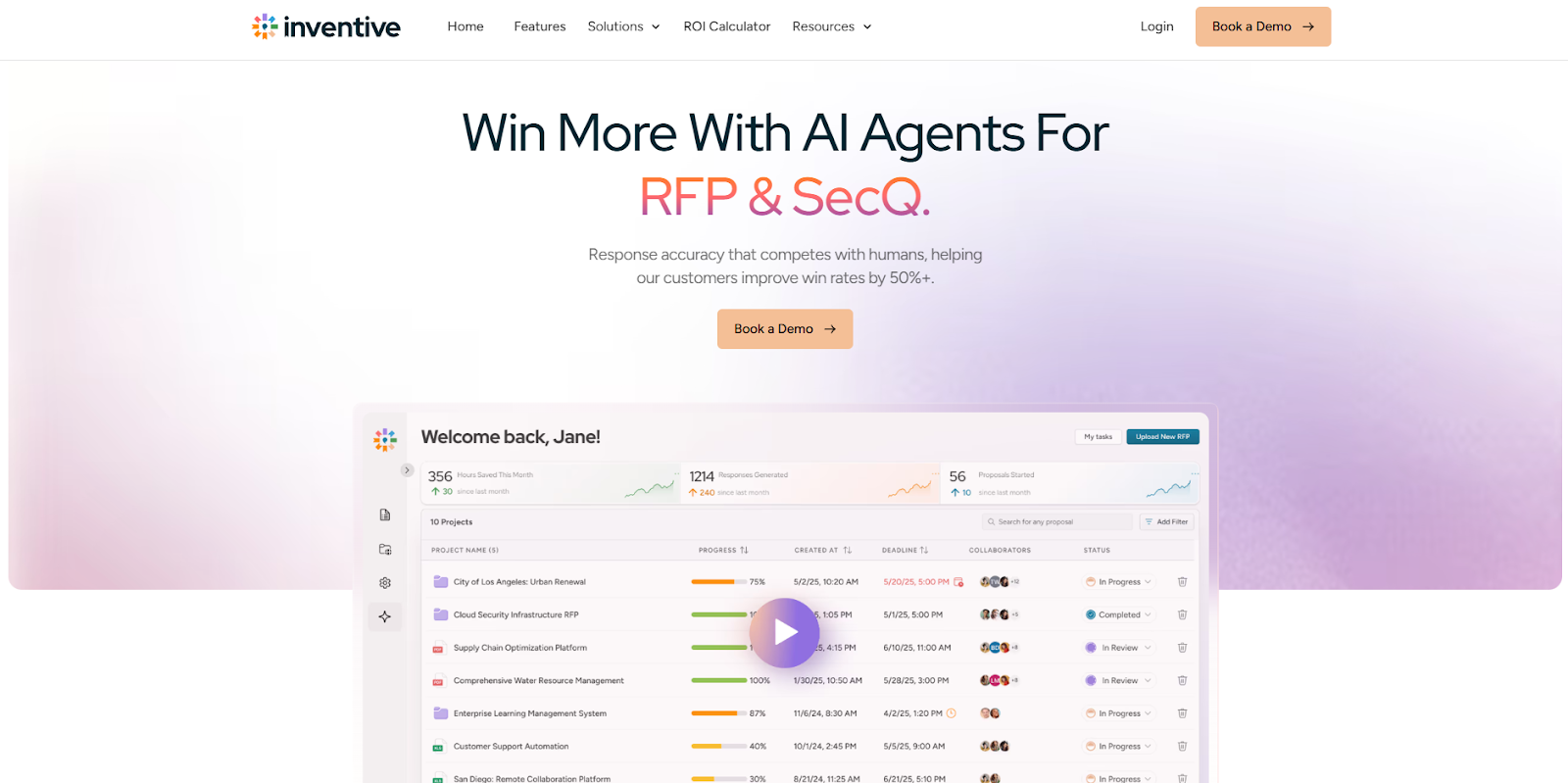
Gartner Rating: 5/5
Enterprise deals live and die by precision, timing, and compliance. Inventive AI is built specifically for this reality.
Unlike generic AI writing assistants, it acts as a specialized RFP and proposal automation system that delivers 10× faster, 95% accurate first drafts, without a single fabricated response.
For large enterprises managing high-stakes bids, Inventive AI transforms proposal creation from a reactive, manual process into a data-driven, evaluator-aligned engine for growth.
Key Features:
- Grounded AI Drafting – Generates complete, citation-backed first drafts up to 10× faster, using only verified internal knowledge bases (no open-web sourcing).
- Win Themes Engine™ – Maps every answer directly to evaluator scoring rubrics, ensuring proposals meet buyer priorities.
- Zero Hallucination Guarantee – Delivers 95%+ content accuracy, flagging missing data instead of guessing.
- Centralized Knowledge Hub – Unifies RFPs, proposals, and questionnaires across SharePoint, Google Drive, Slack, and Teams for collaboration and version control.
- AI Content Manager – Detects outdated or conflicting content automatically, ensuring compliance and brand consistency.
- Analytics & Reporting – Tracks content reuse, draft cycle times, and win-rate correlation for measurable ROI.
Pros:
- Enterprise-grade accuracy and governance for regulated industries.
- Built-in evaluator alignment improves win rates by up to 50%.
- Seamless cross-team collaboration (Sales, Presales, Legal, and Compliance).
- Transparent performance analytics for leadership visibility.
Cons:
- Limited analytics depth beyond core proposal metrics.
Pricing: Usage-based pricing model, determined by the number of RFPs processed each month.
Best For:
Enterprise presales and proposal teams managing complex, compliance-heavy RFPs and contracts, where accuracy, speed, and evaluator trust determine deal success.
2. Gong – Conversation Intelligence for Multi-Stakeholder Deals
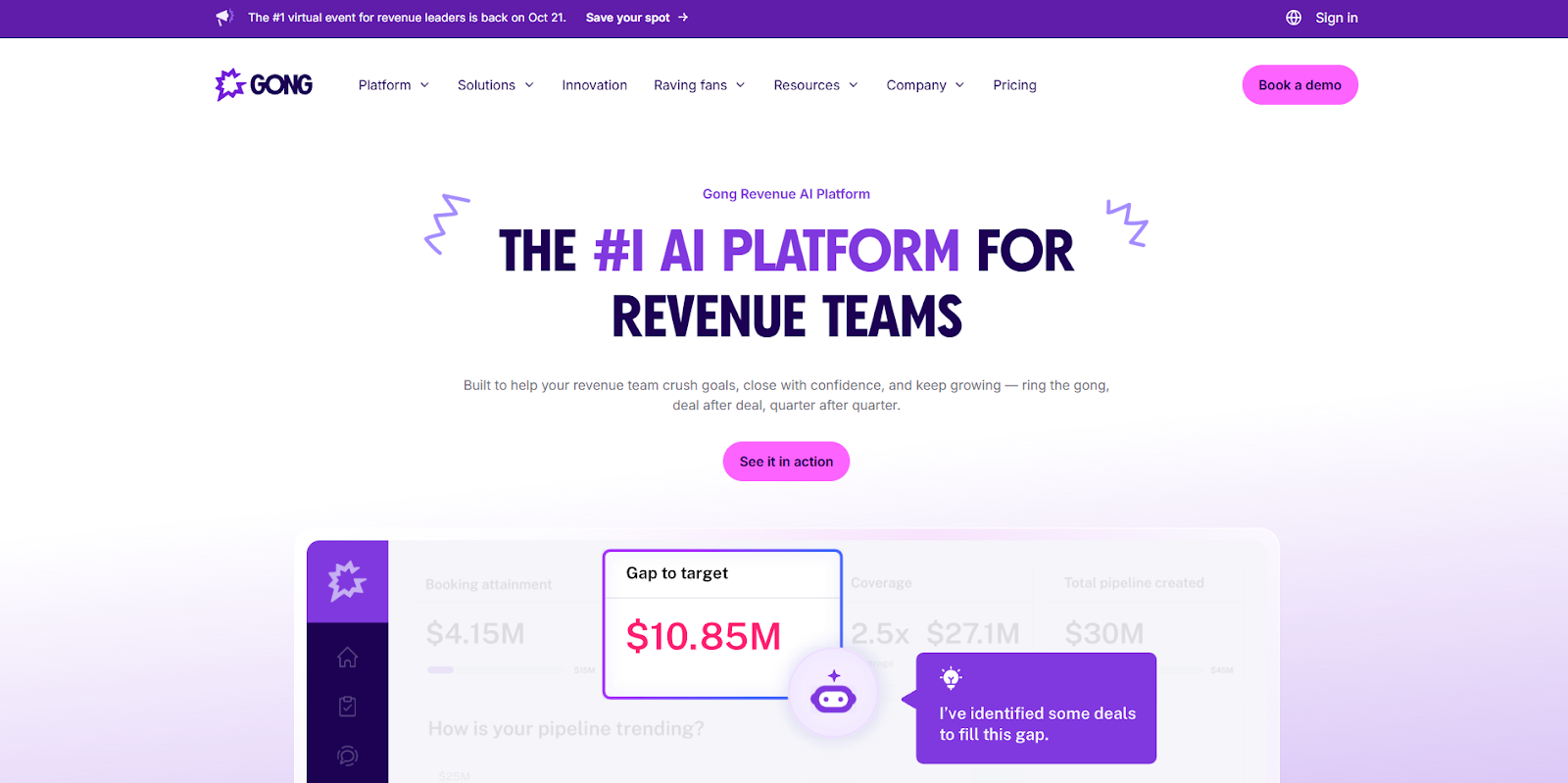
Gartner Rating: 4.7/5
Gong helps enterprise revenue teams capture and analyze every customer conversation to identify risks, buying signals, and competitive mentions. It turns unstructured data from calls, demos, and meetings into insights that drive strategic action.
Key Features:
- AI-powered call transcription and sentiment analysis.
- Automatic identification of competitor mentions, objections, and intent.
- Deal health dashboards highlighting stalled or silent opportunities.
- Coaching insights for AEs and presales engineers.
- Integration with CRMs, Zoom, and collaboration tools.
Pros:
- Deep visibility into buyer engagement across stakeholders.
- Strong insights for coaching and sales enablement.
- Powerful analytics that scale well for large teams.
Cons:
- Conversation insights don’t translate into evaluator-aligned proposals by themselves.
- Large data volume needs disciplined workflows to action effectively.
- Limited impact on late-stage RFP/contract accuracy or speed.
Suggested Alternative:
Inventive AI - Pair conversation insights with execution: Inventive turns call takeaways into citation-backed, evaluator-ready drafts so teams respond faster with zero hallucination.
Pricing: Custom pricing based on user count and recording volume.
Best For:
Enterprise revenue organizations managing multi-threaded opportunities where conversation quality, objection tracking, and sentiment insights are critical to maintaining deal momentum.
3. Clari – Predictive Forecasting and Pipeline Visibility
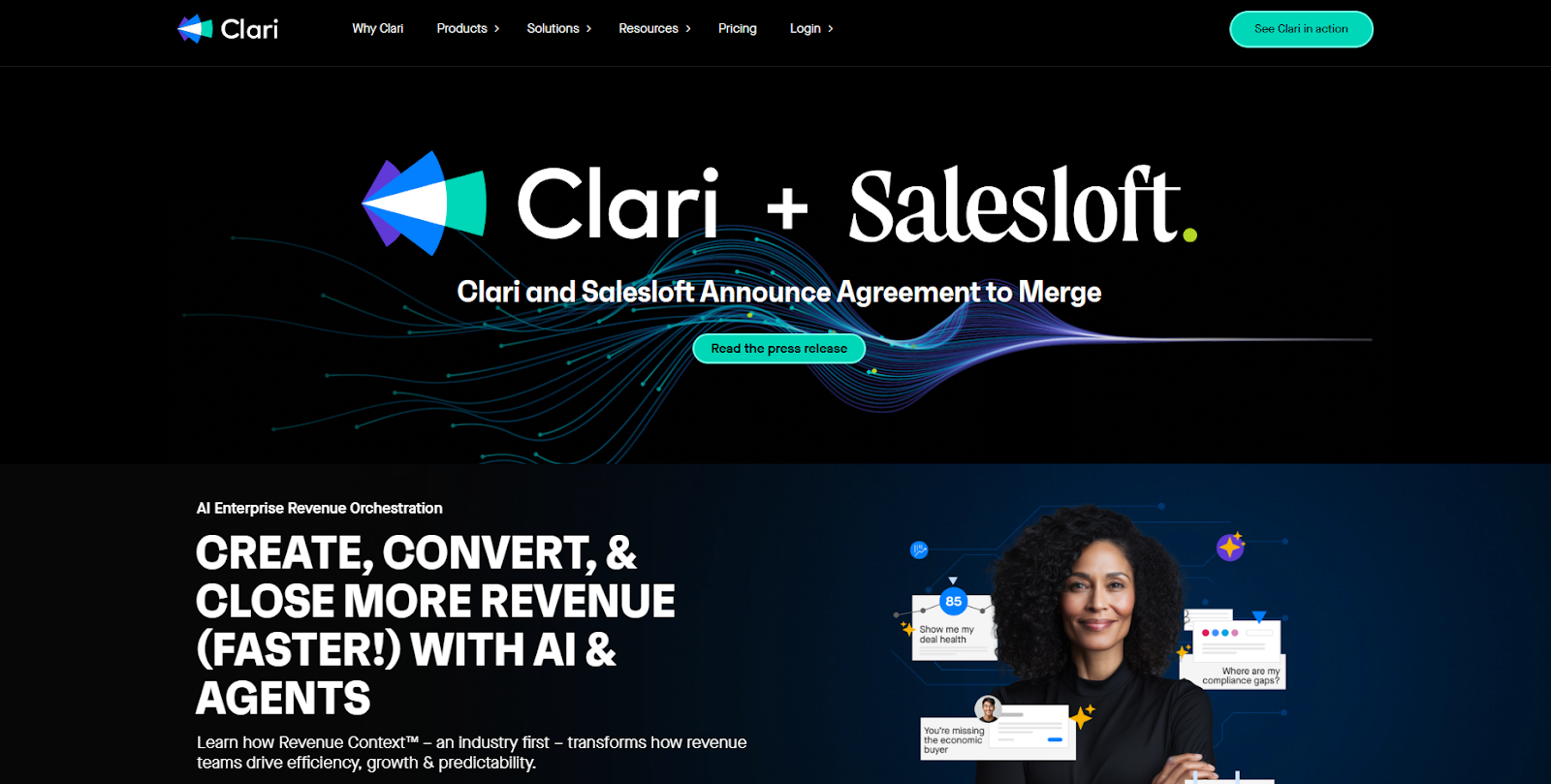
Gartner Rating: 4.7/5
Clari gives sales and revenue operations teams predictive visibility into pipeline health. Its AI models analyze deal activity and historical performance to identify risk, forecast accuracy, and opportunity coverage across regions and business units.
Key Features:
- Predictive deal scoring and probability modeling.
- Pipeline coverage analysis and at-risk deal alerts.
- Scenario planning for best/worst case outcomes.
- AI-driven forecast recommendations and variance detection.
- CRM integrations for automatic activity tracking.
Pros:
- Reliable forecasting accuracy with enterprise data models.
- Excellent visibility for CROs and RevOps teams.
- Scalable analytics and custom dashboarding.
Cons:
- Forecast quality depends on CRM hygiene and consistent activity capture.
- Strong on visibility, light on proposal creation or evaluator alignment.
- Advanced configuration can extend time to value for lean RevOps teams.
Suggested Alternative:
Inventive AI - If forecasting exposes risk but you still struggle to win late-stage deals, Inventive adds grounded drafting and Win Themes to convert visibility into evaluator-aligned proposals and higher win rates.
Pricing: Custom, based on user tiers and analytics scope.
Best For:
CROs, revenue operations leaders, and enterprise sales managers need predictive insight into pipeline health and deal progression across long, multi-quarter cycles.
4. Salesforce Einstein GPT – Embedded AI Inside the CRM
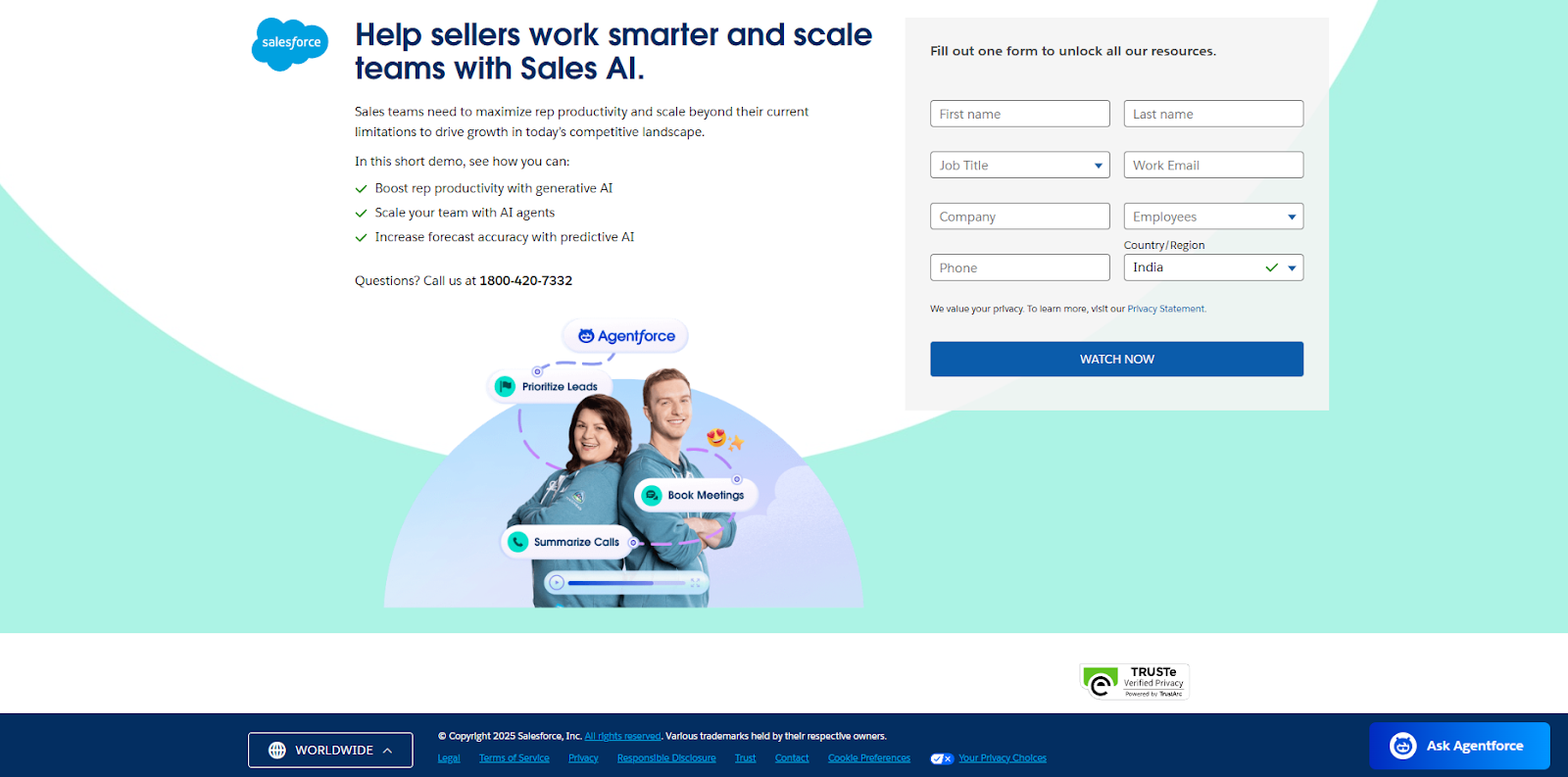
Gartner Rating: 4.3/5
Salesforce Einstein GPT brings generative and predictive AI directly into the CRM environment, automating manual data entry and surfacing actionable insights without forcing reps to leave Salesforce. It’s built to help large enterprise sales teams improve productivity and data hygiene.
Key Features:
- Auto-generated call summaries, opportunity notes, and follow-up drafts.
- Predictive lead and deal scoring using account-specific activity data.
- “Next Best Action” recommendations for each opportunity.
- Seamless data capture from emails, meetings, and calls.
- Native integration with Slack and Tableau for analytics visualization.
Pros:
- Eliminates CRM admin work for AEs.
- Strong predictive capabilities for pipeline prioritization.
- Fully embedded into the Salesforce ecosystem.
Cons:
- Focused on CRM notes, summaries, and scoring—not proposal automation.
- Utility tied to Salesforce adoption and data completeness.
- Higher-tier AI features can add to overall platform cost.
Pricing: Included with select Salesforce editions; advanced AI modules priced separately.
Best For:
Enterprise teams already invested in Salesforce CRM that need real-time AI insights and automation inside existing sales workflows.
5. Outreach – AI-Powered Sales Engagement
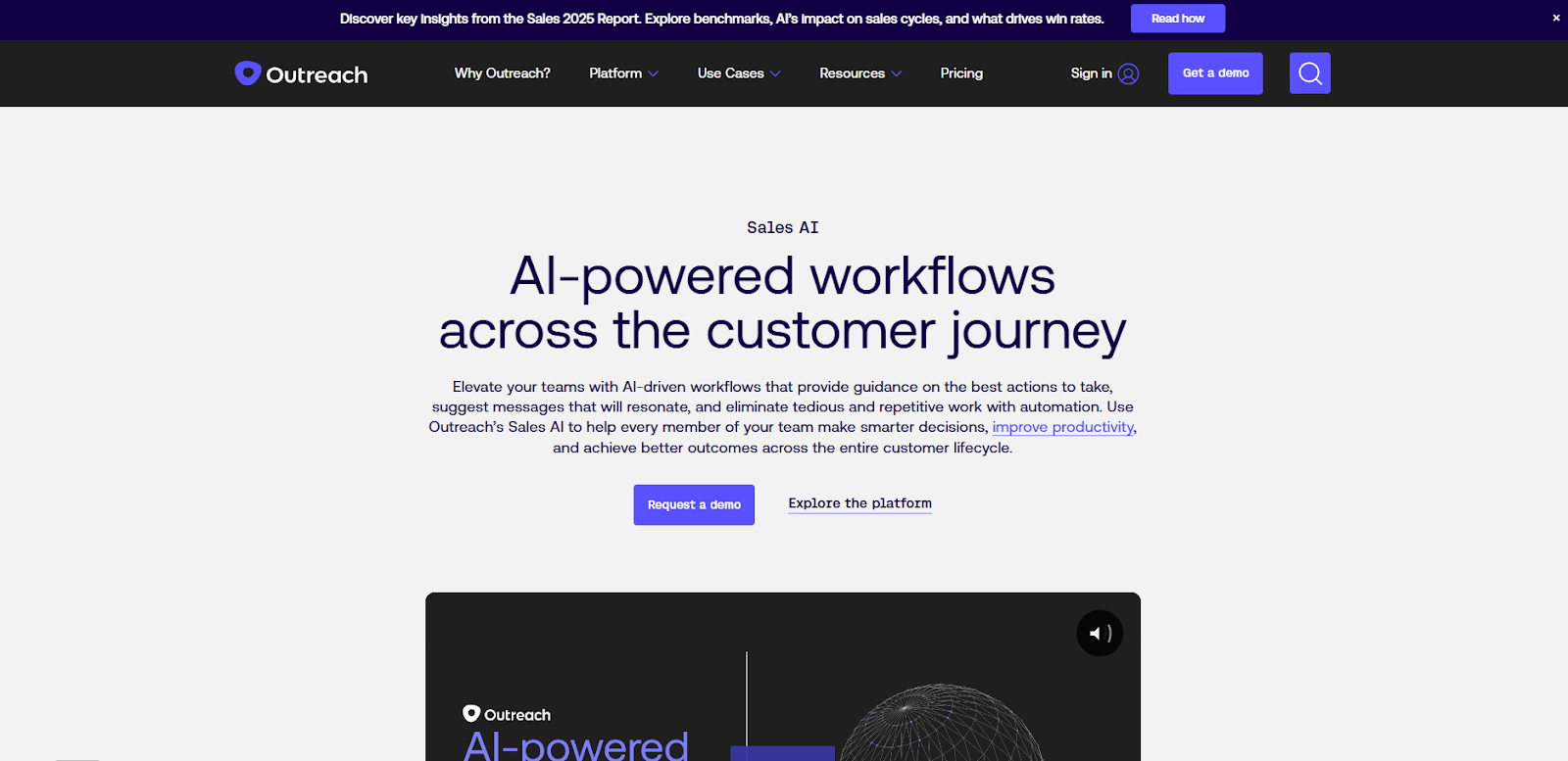
Gartner Rating: 4.4/5
Outreach helps revenue teams maintain consistent engagement across long, complex deal cycles. Its AI engine optimizes outreach timing, tone, and channel mix to sustain buyer momentum and reduce mid-cycle disengagement.
Key Features:
- AI-optimized multi-step sequences for email, calls, and LinkedIn.
- Sentiment analysis to detect disengaged or high-interest accounts.
- Automated reminders and deal health scoring.
- Rep performance dashboards with engagement analytics.
- Integrations with Salesforce, HubSpot, and Microsoft Dynamics.
Pros:
- Excellent for sustaining communication in long enterprise sales cycles.
- Clear engagement visibility across accounts and stakeholders.
- Flexible automation workflows that scale globally.
Cons:
- Over-automation risks generic sequences without careful governance.
- Engagement analytics don’t address proposal drafting or compliance gaps.
- Sequence performance still hinges on external content/knowledge quality.
Pricing: Subscription-based, customized per seat and outreach volume.
Best For:
AEs and SDRs managing multi-threaded enterprise accounts where timely, personalized follow-ups determine deal success.
6. Salesloft – Sales Orchestration for Global Enterprises
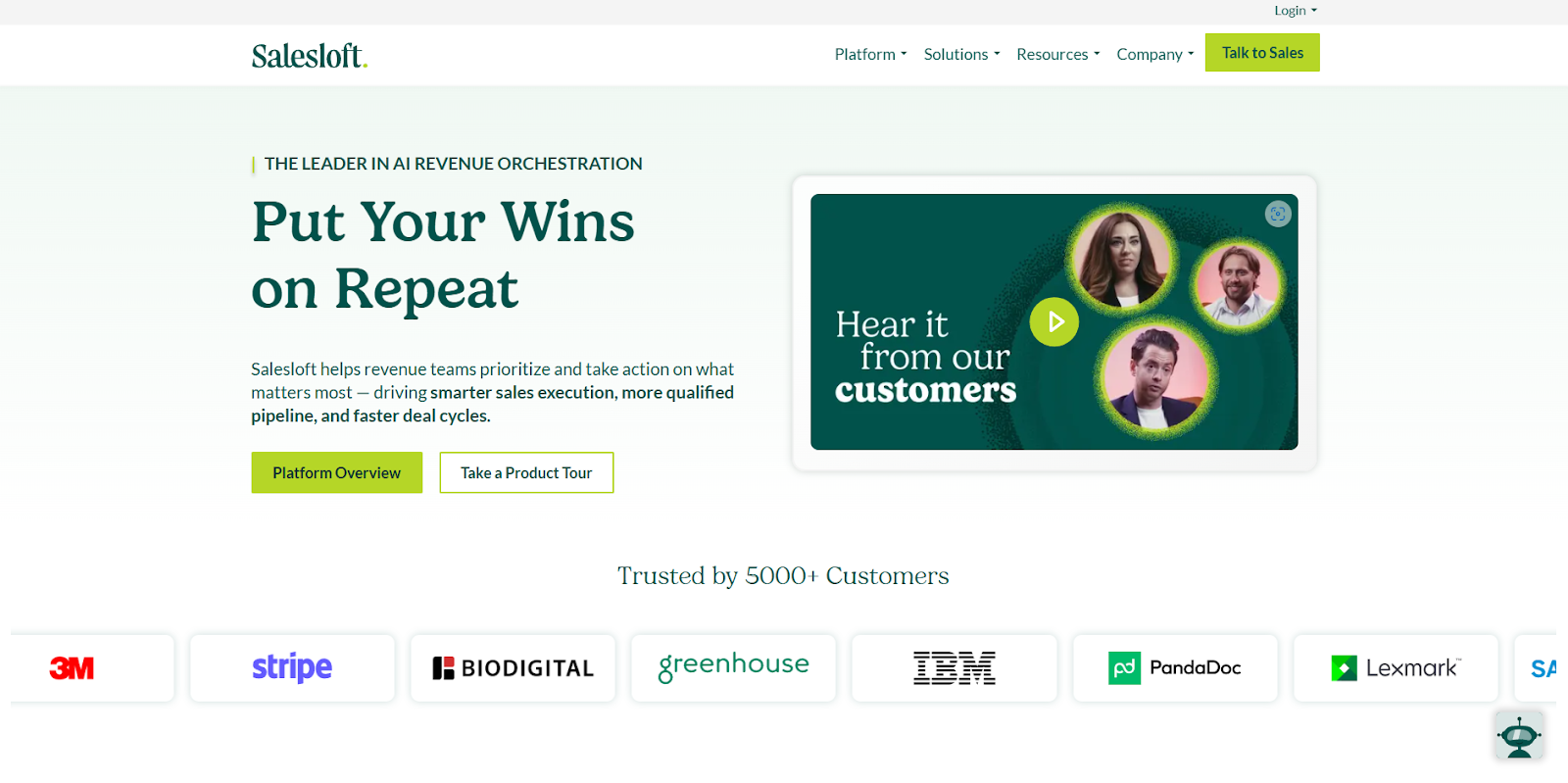
Gartner Rating: 4.4/5
Salesloft helps global revenue teams orchestrate account-based engagement across channels and roles. It combines automation, analytics, and collaboration features to drive consistency across large buying groups.
Key Features:
- Multi-channel campaign orchestration (email, phone, LinkedIn, SMS).
- AI-based next-best-action guidance for each stakeholder.
- Engagement and sequence performance analytics.
- Integrations with Salesforce, HubSpot, and Microsoft Dynamics 365.
- Workflow automation for task management and follow-ups.
Pros:
- Strong enterprise-grade orchestration and governance.
- Deep integration ecosystem.
- Excellent usability for distributed teams.
Cons:
- Orchestration strength, but no evaluator-aware proposal generation.
- Requires clear process design to avoid overlap with other tools.
- Enterprise rollout can be complex across regions and roles.
Pricing: Custom enterprise pricing; per-user licenses available.
Best For:
Global enterprise sales teams needing scalable, multi-channel engagement management across regions and verticals.
7. 6sense – Predictive Account Intelligence

Gartner Rating: 4.4/5
6sense enables enterprise teams to identify in-market accounts earlier in the buying journey by using predictive intent data and behavioral signals. It helps sellers prioritize outreach and align marketing with sales for synchronized account targeting.
Key Features:
- AI-driven intent detection across digital channels and third-party data.
- Predictive modeling for account buying stages.
- Dashboards for prioritizing accounts and tracking engagement.
- Integrations with Salesforce, HubSpot, and major ABM tools.
- Marketing-to-sales alignment analytics.
Pros:
- Excellent for early opportunity detection.
- Deep intent-signal granularity.
- Strong ABM and sales enablement integration.
Cons:
- Intent precision relies on robust data governance and integrations.
- Surfaces “who to target,” not “how to answer” evaluator criteria.
- Cost can be high for teams not running mature ABM motions.
Pricing: Tiered enterprise plans with intent-signal volume options.
Best For:
Enterprise marketing and sales teams seeking to identify high-intent accounts early and focus resources on deals most likely to convert.
8. Demandbase – AI-Powered ABM and Revenue Orchestration
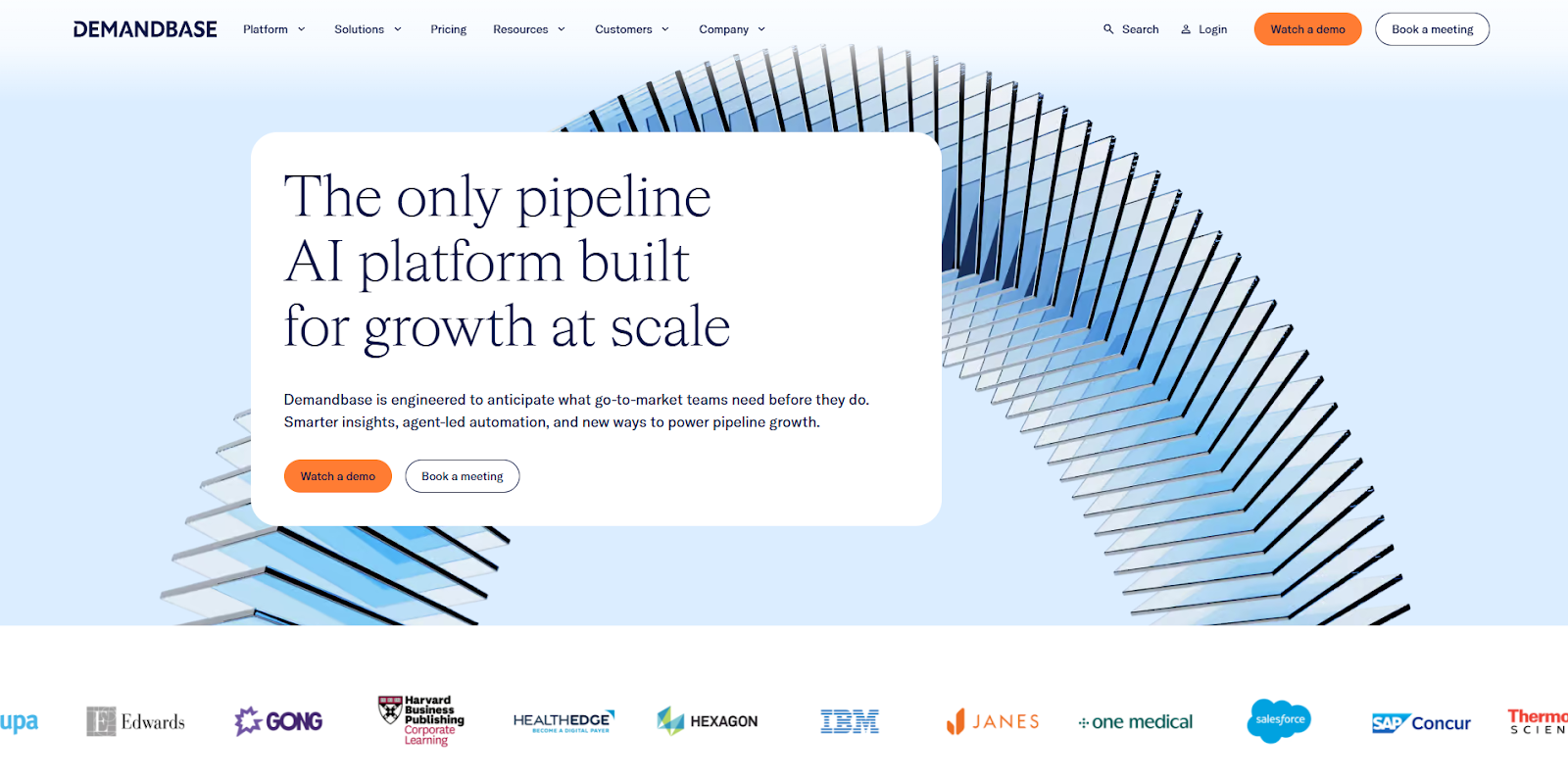
Type image caption here (optional)
Gartner Rating: 4.5/5
Demandbase unifies marketing, sales, and customer success teams around one AI-driven account view. It enables coordinated outreach and pipeline acceleration across complex enterprise buying groups.
Key Features:
- AI-based account prioritization and engagement scoring.
- Persona-level intent and journey tracking.
- Pipeline analytics showing stage progression and conversion.
- Integration with CRMs, MAPs, and ad platforms.
- Revenue orchestration to align multi-function teams.
Pros:
- Holistic account visibility for enterprise ABM.
- Excellent orchestration for multi-department collaboration.
- Strong reporting and pipeline analytics.
Cons:
- Steeper learning curve for cross-team orchestration.
- Best results when paired with a strong proposal/knowledge layer.
- Analytics illuminate gaps but don’t generate compliant responses.
Suggested Alternative:
Inventive AI - Demandbase prioritizes accounts; Inventive closes them; auto-drafting accurate proposals mapped to scoring rubrics and shortening enterprise cycles by up to 90%.
Pricing: Enterprise-grade; custom based on account volume and integrations.
Best For:
Enterprises running large ABM programs across sales, marketing, and customer success teams that require unified visibility and AI-driven prioritization.
Related: Top 10 Proposal Automation Tools for Sales Enablement
Comparison of Top AI Tools for Enterprise Deals
Adoption and Strategy Considerations for AI in Enterprise Deals
Implementing AI in enterprise sales is not just about adding new software; it’s about embedding intelligence into how teams already work. Success depends less on the tools themselves and more on how effectively organizations integrate them across data, process, and people.
1. Start With Verified Data and Governance
AI is only as reliable as the information it draws from. Before deployment, consolidate verified RFP responses, compliance documentation, and proposal templates into a single, approved knowledge base. Each content block should have clear ownership and review cycles to ensure accuracy. A clean, governed dataset enables 95%+ accuracy and eliminates outdated or conflicting content in AI-generated drafts.
2. Integrate AI Into Daily Workflows, Not Around Them
Adoption fails when AI sits outside the tools sales and presales teams already use. The most effective enterprise deployments embed AI directly into platforms like Salesforce, HubSpot, Slack, Teams, and SharePoint, surfacing insights and drafts where users already work. When AI complements existing workflows instead of disrupting them, adoption happens naturally and productivity gains scale faster.
3. Treat Adoption as Change Management
Rolling out AI across presales and revenue teams requires cultural alignment as much as technical configuration. Start small by piloting one high-impact workflow, such as proposal or RFP drafting, and demonstrate measurable time savings to build confidence. Provide clear guidance on when human oversight is essential, reinforcing that AI enhances, not replaces, subject-matter expertise.
4. Build Continuous Governance and Security
Enterprise proposals often involve sensitive customer, financial, and compliance data. Every AI output should be auditable and traceable to its verified source. Implement role-based permissions, approval workflows, and version control to maintain trust and accountability. Enterprise-ready platforms like Inventive AI embed these safeguards natively, ensuring all automation remains compliant and transparent.
5. Measure Impact and Expand Gradually
The most successful teams quantify early wins, validate ROI, and scale intentionally. Benchmark current proposal cycle times, accuracy rates, and win percentages before rollout; then measure post-AI improvements. Many enterprise teams report measurable ROI within 3–6 months, shorter proposal cycles, 95% accuracy, and win-rate lifts of up to 50%. Once a value is proven in one function, expand to adjacent workflows such as demos, PoCs, and technical documentation.
Conclusion
Enterprise deals are high-stakes, resource-heavy, and fiercely competitive. Traditional manual methods leave teams scrambling, spending weeks on drafting, chasing scattered content, and aligning stakeholders. AI changes this reality by compressing timelines, improving accuracy, and surfacing buyer priorities that directly influence evaluator scoring.
We at Inventive AI built our platform specifically to solve these enterprise challenges. With 10× faster first drafts, 95% accuracy with zero hallucination, and Win Themes that align every proposal with buyer expectations, we help sales and presales teams focus on strategy instead of admin. The results are measurable: faster cycles, stronger proposals, and win rates improved by up to 50%.
If your enterprise team is under pressure to win more with fewer resources, it’s time to see how purpose-built AI can give you the edge.
Here’s what our customers say:
"Inventive AI has been a game-changer for our enterprise sales function. Proposal cycles that used to take weeks now take days, and we’ve seen a measurable lift in win rates within one quarter."
— Verified G2 Reviewer, Enterprise Solutions Team
Frequently asked questions (FAQs)
1. How does AI specifically improve enterprise deal win rates?
AI improves win rates by aligning proposals with buyer evaluation criteria, surfacing win themes, and reducing errors. Faster, evaluator-focused responses increase competitiveness in large, complex deals.
2. Can AI handle the complexity of enterprise RFPs and contracts?
Yes. AI platforms like Inventive AI are built to process lengthy RFPs, compliance questionnaires, and contracts by generating accurate drafts grounded in internal knowledge bases. This ensures precision and compliance at scale.
3. What kind of ROI can enterprise teams expect from AI tools?
Enterprises typically see reduced drafting time by up to 90%, accuracy improvements of 95%, and win rate lifts between 30–50%. This translates into faster cycles and more revenue per seller without adding headcount.
4. Is it secure to use AI for sensitive enterprise proposals?
Security is critical in enterprise sales. Inventive AI ensures role-based access, audit trails, and strict data privacy. Unlike generic AI, it never pulls from the open web, keeping all responses grounded in verified, internal data.
5. Can AI replace presales engineers and proposal managers?
No. AI complements rather than replaces human expertise. While it automates repetitive drafting and retrieval tasks, strategic input, storytelling, and client relationship-building remain human-driven.

90% Faster RFPs. 50% More Wins. Watch a 2-Minute Demo.
After witnessing the gap between generic AI models and the high precision required for business proposals, Gaurav co-founded Inventive AI to bring true intelligence to the RFP process. An IIT Roorkee graduate with deep expertise in building Large Language Models (LLMs), he focuses on ensuring product teams spend less time on repetitive technical questionnaires and more time on innovation.
Recognizing that complex RFPs demand deep technical context rather than just simple keyword matching, Vishakh co-founded Inventive AI to build a smarter, safer "RFP brain." A published author and researcher in deep learning from Stanford, he applies rigorous engineering standards to ensure that every automated response is not only instant but factually accurate and secure.


